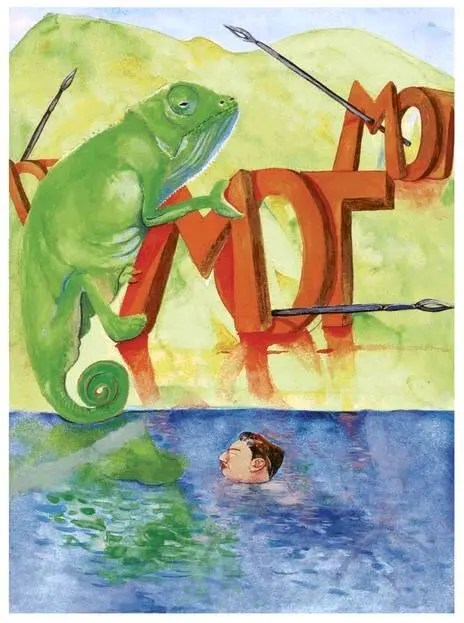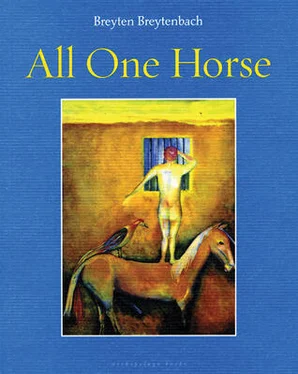Lord Alone knows from where. It is horrible, huge, green, objectionable, obstructive, flailing around because it seems to be maimed or incomplete, lacking a mandible or a few limbs, like an enormous broken intromittent organ, outsize ma non troppo . It must be of the locusta species, though not loquacious, but bigger than either lobster or locust, with a head reminiscent of the size and shape of the horse’s. This one is glass-like and eyeless. Is it a visitation? It is only too real. An iconoclast then? A defacer, eraser, barbarian? Can it be a parasite? An insect by figure of speech? The imago? Bug? Louse? Nit? Maggot? Earwig? Mite? Weevil? Ant? Termite? Horse? Pest? Groping grasshopper? Cicada? Cricket? A guzzler in other words? A gormandizer? Vulture? Hog? Trencherman? Pantophagist? A belly-god? Limbless Lucullus? Or is it on the other hand? A mantis? A kind of orthopterous heirophant, munshi, initiator, mystagogue? A sort of monstrous coryphaeus which will devour the inmate hard after the joyride?
Ah, we break our heads but we can come to no understanding except that it is horrendous, of another intelligence because of no intelligence perceivable by us, perhaps a computer in wild screaming revolt, and in the way. We must get it out of the way if we wish to continue. And we so wish it.
So, with great trouble, using sharp pens, we manage to bundle it into the broom-locker. We bar and lock the door: from behind the partition or the page we can hear the thumping and the sounds of shivering. How very tiring.
By the way, that night we dream. We dream that some One has come to our Place to explain. In our dream we shed tears of humble understanding.
How can we believe our eyes when we wake up? In the mirrors there are many grey drawings of the mantis explaining all, divulging the sequences, showing where the Word comes from and whence the Silence. There are no secrets, ever; only their intimate reflections. The sun is so bright that it must refract all light. A drawing is always in the present tense.
Then we comprehend that we didn’t comprehend, that is all. It is quiet behind the door, no more scratching or other life or lifelike ness. And we are in heaven. So glad, so glad. We now know we have the sacred Hompus lompus in the cupboard. We shall make of the cell a sanctuary. From far and wide, pilgrims will come to prostrate themselves before the absent bones of God .
the body quivers with the word

First of all there should be no wind. Wind is a bother because it dries out the soil and makes digging so much more difficult. Wind is upsetting for the ceremony, you will see anon when it rocks the boats and rustles the clothes of the elect. A feather of unasked-for breath may bring the transients to come crashing down in the dust. Dust to dust and so on. More, much more: wind is nefarious because it evokes memories of far-away experiences, moods of transcendency, slivers of childhood, imagined languages enunciated by trees and clouds — and if all this does not add up to life, what then does? No, dead must be dead and life off to one side. By all means let there be wind, but in abeyance, dusting its hindquarters beyond the hill where the Squatters live.
This side of the hill, yes. It always takes place this side of the hill. Here exactly the lines of history and the earth cross: that there must be a hill or mound or tumulus between Masetedi (they of the shining countenance) and Squatters. A line of cypresses traces the route winding downwards, like crosses waiting to be put to use, like solemn unshaven gladiators holding up green shields in the matutinal glitter. The procession must start during the early hours from the crest down. (Or beyond?) For two reasons: in the beginning to benefit from cool shadows of the odiferous morning muting sound and masking smell, and then to be timed so as to reach its apotheosis in midday glory. Then there can be no veiling, no hidden intentions, no softening of lines!
Long ago we knew the sea. Heretics aver that we all, Masetedi as well as Squatters, emerged from the waters. But we resolutely foreswear the abomination of oneness. We believe that memories ought to be left untouched, a sea of deadness, but we do not always succeed in cutting off the feedlines between death and life, in severing the process between root and fruit. Thus we continue referring to our coffins as boats. Thus too our rejection of wind. Does it not bring to water the illusion of life? Does it not invest the sea with incestuous caresses? But movement. Movement is our way around the dichotomy. The dead must move, although not too much and never of their own free will. Our boats are whitened mirrors bobbing on the liquid surface of unsoundable nothingness.
Ah, we need this ceremony to deaden the past. Keep it down! Lie there and don’t move! Increase what came before, feed it, fatten it, pork it; pare life down to an even thinner slice; but paradox, all the more the past is dead or the dead is past — and death is by the way a matter of more volume — all the more life grows to be enhanced by the absence of the other. If you divide a thing in half you will never come to the end of it. The moon also grows from the night.
And so we extend the sea. We know where it is because it doesn’t exist for us. Purity, my brother. Only chasteness can permit us to pass unnoticed! We are the Masetedi. Even if our lives were disastrous, a fumbling of frontiers, a cack of compromising, our passing at least should at last go unobtrusively.
Therefore the select ones are painted. They are propped up on the biers, blanched, pasty-face, each fixed in the white position of seated authority. Down in the valley the tombs are ready. Our need is so great that we sometimes have to go far into the earth. There are generations of graves, stretching back to oblivion. The diggers have prepared the holes, but diggers also come and go: they cannot pass on their knowledge of holes and they do not always remember which ones have been crossed out. So they kneel when in doubt and holler down: ‘ Halloooo. . Lie there and don’t move …’ waiting, perhaps, for a distant echoing sigh like that of the sea lamenting the land. And they are worried. How long before we transpierce the hill and let through the wind? And the dissolute Squatters then, committing life as if it were something to be lived!

There is no wind. Slowly slowly the bearers bring down the boats. Stiff upright the painted ones sit, no wind giving tongue or lip to the festive garments, or tilting the ceremonial hats. Maybe just a curt nod here and there where a foot encounters a stone. Soon the sun will hit the roof. All the actors are standing by: the unmemorable diggers having dug, the carriers bustling now like agitated ants burying the future before the storm, the elect travelling dead with glinting white faces, and Mfowethu the Brother who must pronounce the oration.
We come to a stop. The shadows shrink to minor and obsolete annotations attempting to hide from the sun in the protection of our shadows. This is the difficult moment. Now is not the time to make the eye do like a bat or to emit an afterthought of life through the anus. I am proud to be of the chosen and sit as quiet as may be under the dead weight of pigment and burial clothes. Now is the time for all patriots to come to the aid of their country.
Slowly, ever so slowly — I recall hearing that in the old days the traveller journeyed so leisurely that he was no longer a foreigner upon arrival — slowly I move my eyes to focus on Mfowethu perorating.
Читать дальше














